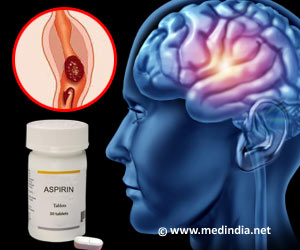Aspirin reduces ageing of cancer genes, whereas smoking can accelerate the ageing of cancer genes, reveals new study.

According to a research led by Prof. Primo Schar, from the University of Basel and PD Dr. Kaspar Truninger, aspirin decreased the risk of cancer by slowing down certain aging processes of the genome, namely modifications that also play an important role in the development of tumors.
In order to analyze the relationships between lifestyle and genome aging, the researchers examined intestinal tissue samples of 546 healthy women over 50 years of age. They compared age-specific changes of gene markers, so-called DNA methylations, with their lifestyle factors regarding aspirin use, smoking, body mass index and hormonal replacement therapy. The most significant effects were measured for aspirin use and smoking.
Schar said that each cell's genome was like a library full of bookmarks, and the cells know which genes to read with help of these bookmarks, so that they can fulfill their specialized tasks as skin, muscle or intestinal cells.
But these markers were not very stable and change during the course of age, which lead to development of tumors, he added.
First author of the study Dr. Faiza Noreen, added that the factors especially affected the genes that also play a role in the development of cancer, and Truninger emphasized that it would be premature to start taking aspirin solely for cancer prevention without consulting a doctor first, since it potential side effects such as gastrointestinal bleeding.
Advertisement
Source-ANI















